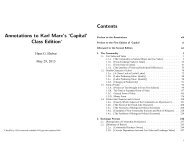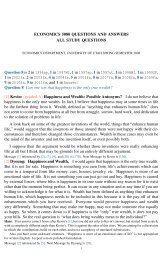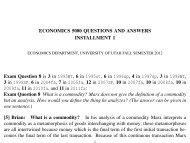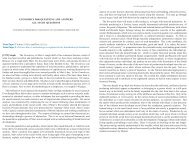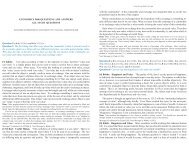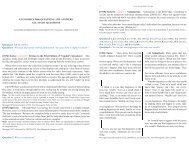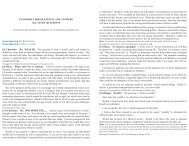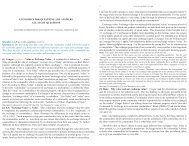Question 1 What did Marx mean with his formu - University of Utah
Question 1 What did Marx mean with his formu - University of Utah
Question 1 What did Marx mean with his formu - University of Utah
Create successful ePaper yourself
Turn your PDF publications into a flip-book with our unique Google optimized e-Paper software.
U <strong>of</strong> <strong>Utah</strong> Econ 5080 2007fa 31<br />
With all t<strong>his</strong> said, now it is time to analyze the “negation <strong>of</strong> the negation” as the text so<br />
eloquently puts it. <strong>Marx</strong> takes all that I have just said and poses a contradiction. Despite all<br />
these arguments, exchange value does indeed appear to be inherent in the commodity. For<br />
example, If I were making silk and I wanted to trade 3 yards <strong>of</strong> silk for x lbs <strong>of</strong> wheat then<br />
one might say that that exchange is possible because I have a special relationship <strong>with</strong> the<br />
wheat guy/gal. However, it is not that simple because I can trade my 3 yrds <strong>of</strong> silk for x<br />
amounts <strong>of</strong> barley, buttons, or milk (just about anything) and the amounts will change. It<br />
becomes implausible to say that I have a special relationship <strong>with</strong> everyone I can trade <strong>with</strong>!<br />
So it appears as if the exchange value is inherent to the commodities in the sense that when<br />
I trade different things I can get more or less or something.<br />
The answer to t<strong>his</strong> dilemma is what <strong>Marx</strong> calls “replaceability.” <strong>What</strong> t<strong>his</strong> <strong>mean</strong>s, is that<br />
none <strong>of</strong> the many different trades that I can make are “inherently favorable” to the others.<br />
Here is the justification; I can trade silk for wheat, silk for buttons, and silk for milk; in the<br />
end however the people I am trading <strong>with</strong> along <strong>with</strong> the different products I am trading for<br />
are replaceable. All the trades are equal and fair, in content although their quantities may<br />
differ.<br />
In conclusion: The relationship between the buyer and seller is inconsequential. It is<br />
the usefulness <strong>of</strong> the commodity alone that determines its exchange value (plus the labor<br />
required to obtain it). Once these use-values are established then they can carry some kind<br />
<strong>of</strong> exchange-value and that exchange value is not on an individual scale but a social scale.<br />
Hans: Excellent, very careful reading. The only quarrel I have is: how do you argue the following sentence:<br />
“Exchange-value can not be inherent in the commodity because the commodity’s usefulness (its use-value) is independent<br />
<strong>of</strong> exchange-value”? <strong>Marx</strong> used the variability and relativity <strong>of</strong> exchange-values to argue that it cannot be<br />
inherent to the commodities.<br />
Message [117] referenced by [275]. Next Message by Daniel is [129].<br />
[154] HTJY: Exchange-value appears to be something inherent in the commodity.<br />
<strong>Marx</strong> presents on P126 in Capital a perspective from which exchange-value does not appear<br />
to be inseparably connected <strong>with</strong> the commodity. In a closer scrutiny <strong>of</strong> the matter,<br />
however, he presents another convincing perspective from which exchange-value appears to<br />
be inseparably connected <strong>with</strong> the commodity.<br />
If exchange-value is inseparably connected <strong>with</strong> the commodity, it should not depend<br />
on the time and place in which the exchange occurs. For example, if a dozen <strong>of</strong> eggs was<br />
exchanged for a gallon <strong>of</strong> milk in New York in May 2006, then the same exchange relation<br />
must hold in San Francisco in May 2007. However, such a relation is not likely to hold in<br />
general. Thus, t<strong>his</strong> and other similar counter examples indicate that exchange-value is not<br />
inseparably connected <strong>with</strong> the commodity.<br />
Is exchange-value truly something not inseparably connected <strong>with</strong> the commodity? <strong>Marx</strong>’s<br />
closer scrutiny <strong>of</strong> the matter suggests that the answer is no. Suppose that x amount <strong>of</strong> commodity<br />
A is exchanged for y amount <strong>of</strong> commodity B or z amount <strong>of</strong> commodity C. Then,<br />
since commodity B and commodity C each represent the exchange value <strong>of</strong> the same commodity<br />
A, these two commodities are <strong>of</strong> the same magnitude. T<strong>his</strong> implies that there exists<br />
a common element <strong>of</strong> the same magnitude which is in both B and C. Moreover, B and C as<br />
exchange values for A are merely modes <strong>of</strong> expression <strong>of</strong> the common element. <strong>Marx</strong> calls<br />
the common element in commodities, value. Values are crystals <strong>of</strong> human labor power in the<br />
32 2007fa Econ 5080 U <strong>of</strong> <strong>Utah</strong><br />
abstract expended to produce commodity. Thus, exchange-values are inseparably connected<br />
<strong>with</strong> commodities in the sense that exchange-values are modes <strong>of</strong> expression <strong>of</strong> values which<br />
are necessarily in each and every commodity.<br />
Hans: Yes, very good.<br />
Next Message by HTJY is [289].<br />
[199] Tim: Replaceability. <strong>Marx</strong> argues that the exchange-values’ constant change <strong>with</strong><br />
time and place seem to be “accidental and purely relative” [126:2]. <strong>What</strong> <strong>Marx</strong> is getting at<br />
is that the quantities <strong>of</strong> use-values exchanged vary from trade to trade and that there is no<br />
constant, therefore exchange-value cannot be inherent in a commodity.<br />
<strong>Marx</strong>’s rebuttal compensates for t<strong>his</strong> “accidentality” and “pure relativity” by introducing<br />
replaceability [127:1]. Replaceability justifies that no one trade made is better than the other,<br />
that they are all “equal in content” (Annotations, pg. 24) which now makes exchange-value<br />
something inherent in a commodity.<br />
Hans: You say that the constant changes in exchange-value seem accidental. <strong>Marx</strong> said something a little different,<br />
namely, that because <strong>of</strong> its constant changes the exchange-value itself seems accidental and not inherent in the<br />
commodity.<br />
Replaceability is part <strong>of</strong> <strong>Marx</strong>’s rebuttal. T<strong>his</strong> rebuttal has three steps which can be considered a dialectical<br />
negation <strong>of</strong> negation: (1) every commodity can be exchanged for many others, but (2) each <strong>of</strong> these trades are<br />
replaceable <strong>with</strong> each other, therefore (3) they are only different ways <strong>of</strong> expressing something inherent in the<br />
commodity.<br />
Next Message by Tim is [202].<br />
[200] Ozz: graded A– Exchange value arguments. <strong>Marx</strong>’s argument concerning the conclusion<br />
that exchange values are not something inherent is explained simply in the difference<br />
<strong>of</strong> quantity a certain commodity can be exchanged for in differentiating times and places.<br />
<strong>Marx</strong> explains saying “Exchange-value manifests itself at first as the quantitative relation,<br />
the proportion, which use-values <strong>of</strong> one sort are exchanged against use-values <strong>of</strong> another<br />
sort...a proportion which constantly changes <strong>with</strong> time and place.” T<strong>his</strong> signals that the commodity<br />
might not hold an inherent exchange-value because if the proportions to which they<br />
are traded are always changing then the exchange-value is not due to the commodity but to<br />
the circumstances <strong>of</strong> the trade.<br />
<strong>Marx</strong>’s rebuttal to t<strong>his</strong> argument concerns the “expression <strong>of</strong> a deeper social relation located<br />
underneath”. T<strong>his</strong> deeper social relation consist <strong>of</strong> the social relationship <strong>of</strong> the commodity<br />
in regards to other commodities and the use-values the commodity supplies. In the<br />
commentaries, the example <strong>of</strong> the flashing car lights explains t<strong>his</strong> concept very well. The<br />
example makes clear <strong>of</strong> how cars flashing their lights at first could be mistaken, however;<br />
after time one realizes it <strong>mean</strong>s to turn on your own head lights. T<strong>his</strong> social relationship<br />
between commodities signaling to each other their exchange value, which occurs over periods<br />
<strong>of</strong> time, will eventually lead to a general exchange value that is thought to be inherent<br />
in the commodity. <strong>Marx</strong> uses the word “replaceable” saying that the owners treat the various<br />
exchange values <strong>of</strong> their commodities as “replaceable” expressions <strong>of</strong> the same thing.<br />
Meaning that when one comes to believe that commodity X is usually traded for three units<br />
<strong>of</strong> Commodity Y then you begin to realize that due to the social relations commodities can<br />
seem to take on an inherent exchange value.<br />
Hans: Are you thinking a social relationship is an attitude or fad where everybody thinks the same thing? Look at<br />
my remark made about [149] for t<strong>his</strong>. As you said in your in-class answer, the “thing” inherent in the commodities<br />
is labor. They are all part <strong>of</strong> a social division <strong>of</strong> labor. These are real social interdependencies, not just attitudes.



